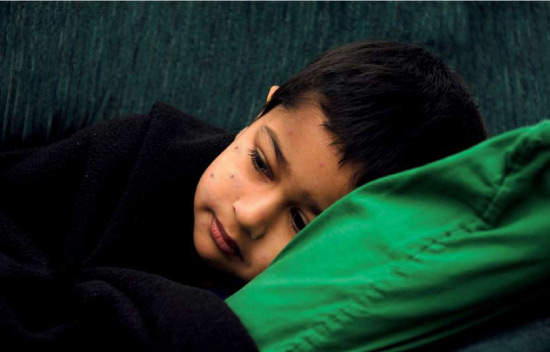Mouth ulcers are small, round or oval-shaped painful lesions that appear in the mouth. They can occur on the inner side of the cheeks or lips, the edge of the tongue, or at the base of the gums.
Chickenpox is highly contagious and can spread easily from person-to-person through air, saliva or direct contact with an infected person. Thus, anticipate your child to get chickenpox at some point during his childhood. If you have not paid much attention to information on chickenpox, here’s your chance to find out how you can care for your child with this illness.
Reduce the Itchiness
While you cannot completely get rid of the itchiness, you can make him more comfortable.
- Give your child either lukewarm or cool baths every 3 to 4 hours.
- Use mild soap for bathing to avoid irritating his overly sensitive skin.
- Apply calamine lotion, which helps to relieve itchy rashes.
- Dress your child in light clothing that is less likely to irritate his skin.
If your child suffers from severe itch, check with your doctor about prescribing him antihistamines.
Prevent Scarring
When your child scratches himself, bacteria on his hands and under his fingernails may infect the broken skin blisters, causing skin infections that may lead to permanent scarring. Prevent your child from scratching himself. Other tips include:
- Keep your child’s fingernails short so he won’t hurt his skin should he scratch.
- When he sleeps, let him wear cotton gloves or mittens to prevent him from unconsciously scratching himself.
- Pat him dry instead of rubbing him after a bath to prevent breaking the blisters.
Eating Right
Your child may not have the appetite to eat much in the first few days of chickenpox. Blisters may sometimes form in his mouth and throat, making it difficult for him to eat. So, during this period you should:
- Ensure your child gets plenty of fluids (ie plain water or fruit juices) to stay hydrated.
- Feed a well-balanced diet to help your child recover from the disease.
- Offer foods that are soft in texture, cold and bland to make eating more comfortable.
Preventing the Spread
To prevent an infected child from spreading chickenpox to his siblings, here’s what you can do:
- Separate them before any sign of chickenpox rash appears and until the rashes clear up.
- Ensure the siblings wash their hands frequently.
- Caregivers must also take extra care of their hygiene after coming into contact with the infected child.
- Antiviral agent like acyclovir, if given early in the course of the disease, will help reduce the severity.
Preventing Chickenpox
While chickenpox is often mild, seeing your child suffering such discomfort can be distressing. The disease may also potentially develop into a more severe condition. Thus, if parents want to avoid all the hassle that accompanies chickenpox, there are a few things they can do to prevent chickenpox.
- Breastfeeding
Mother’s who have had chickenpox are immune to the disease and will probably pass on this immunity to her newborn baby through the antibodies in her breast milk. Thus, mothers are encouraged to breastfeed their newborns for at least the first few months of their life. - Vaccination
According to the Centres for Disease Control and Prevention (CDC), chickenpox vaccine is the best way to prevent chickenpox, offering complete protection to about 80-90% of children who are immunised. Getting chickenpox during the teens or adulthood will have more severe complicatons.
Four Diseases-in-One
By now, the new tetravalent MMRV (measles, mumps, rubella & varicella) vaccine, which combines the compulsory measles, mumps and rubella (MMR) vaccine with the chickenpox vaccine, is available. Parents can now opt to give their child additional protection against chickenpox without increasing the number of injections for their child. Talk to your doctor if you would like to explore this option.






Comments